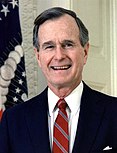Republican Party presidential primaries, 1992
|
|
|||||||||||||||||||
|---|---|---|---|---|---|---|---|---|---|---|---|---|---|---|---|---|---|---|---|
|
|||||||||||||||||||
|
|||||||||||||||||||
|
|||||||||||||||||||
The 1992 Republican presidential primaries were the selection process by which voters of the Republican Party chose its nominee for President of the United States in the 1992 U.S. presidential election. Incumbent President George H.W. Bush was again selected as the nominee through a series of primary elections and caucuses culminating in the 1992 Republican National Convention held from August 17 to August 20, 1992, in Houston, Texas.
President George H. W. Bush was challenged by conservative commentator Pat Buchanan, and during the early counting of the votes at the New Hampshire primary, it appeared that the President might actually lose. However, Buchanan faded by the end of the evening, and Bush won all the rest of the primaries. Bush's margins in many of the primaries were not as large as expected, and led to the rise of Ross Perot as an independent candidate.
Former Democrat, Republican Louisiana State Representative and former Ku Klux Klan leader David Duke also ran in a number of primaries, but he did not receive any delegates. Former Governor Harold Stassen of Minnesota also made a quixotic bid for support in the Minnesota primary, winning enough votes to entitle him to one delegate, but was later denied his single vote by machinations at the Minnesota Republican Party's 1992 state convention.
...
Wikipedia


